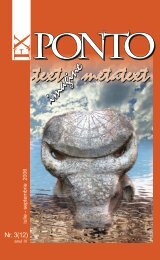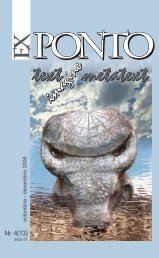Nr. 2 (19) anul VI / aprilie-iunie 2008 - ROMDIDAC
Nr. 2 (19) anul VI / aprilie-iunie 2008 - ROMDIDAC
Nr. 2 (19) anul VI / aprilie-iunie 2008 - ROMDIDAC
You also want an ePaper? Increase the reach of your titles
YUMPU automatically turns print PDFs into web optimized ePapers that Google loves.
Horizontal in a deckchair on the bleak ward,<br />
some feeble-minded felon in pajamas, clawing<br />
a Social Credit broadside from your table, you saying,<br />
“… here with a black suit and black briefcase: in the briefcase,<br />
an abomination, Possum’s hommage to Milton.”<br />
Then sprung: Rapallo, and then the decade gone;<br />
then three years, then Eliot dead, you saying,<br />
“And who is left to understand my jokes?<br />
My old Brother in the arts… and besides, he was a smash of poet.”<br />
He showed us his blotched, bent hands, saying, “Worms.<br />
When I talked that nonsense about Jews on the Rome<br />
wireless, she knew it was shit, and still loved me.”<br />
And I, “Who else has been in Purgatory?”<br />
And he, “To begin with a swelled head and end with swelled feet.”<br />
(Lowell, 977)<br />
More like the rock sonnets quoted above, Lowell’s poem deftly mixes<br />
biographical factoids and landmarks in Western poetic traditions with political<br />
and contemporary culture realia. Bishop’s attitude is more rock-like in the<br />
sense of an impulsive release of certain deep identity-shaping and mainly<br />
sexual strains that have also left an enduring imprint on the history of rock as<br />
a performance art that (also) employs lyrics. Although her sonnet proves multilayered<br />
subtleness and refinement, there is a certain urgency and ultimate<br />
frankness to it which is consonant with the pungent drive in most of rock<br />
lyrics, including (or so much the more) in those anthologized as praiseworthy<br />
pieces of poetry. Lowell’s sonnet is by comparison closer to the poetry of<br />
professional poets who write about rock or rock music icons, whence the<br />
filtering of the existential charge through more obviously displayed cultural<br />
and craft-related elements.<br />
I find the paralleling of these sonnets by two major postmodern poets to<br />
the poetry of/on rock quite relevant, since indeed, the emphasis on the art<br />
and craft of poetry and hence on the voice of the poet as poet, mouthpiece of<br />
a time and epitome of a culture has come down in the heritage of Lowell as<br />
critical skepticism regarding a certain grandiloquence and affectation which<br />
are not be found in the more existentially straightforward while also less<br />
self-aggrandizing voices of peers like Bishop, O’Hara and Berryman (cf. for<br />
instance A.O. Scott, unpag.). Such characteristics in the poetry of these latter<br />
poets are, as we have discovered above, salient ones in rock poetry as well,<br />
a poetry that by standing at so many kinds of cultural crossroads has had to<br />
select, encourage, and cultivate styles and manners in mainstream poetry<br />
that were the most compatible to its own purposes and scope. Rock poetry is<br />
thus both a reservoir of tendencies in contemporary poetry that are the most<br />
suitable for American culture as a predominantly pop culture tilted civilization,<br />
as well as a (popular culture) filter that sometimes prophetically encourage<br />
elements that are not yet prevailing in literary poetry. We have thus seen<br />
here how rock and rock-related poetry can sometimes turn into an accurate<br />
barometer of mainstream poetry and an instrument to validate or re-evaluate<br />
established critical assessments of contemporary American poetry.<br />
Ex Ponto nr.2, <strong>2008</strong><br />
125

















